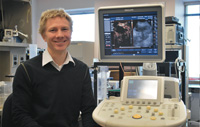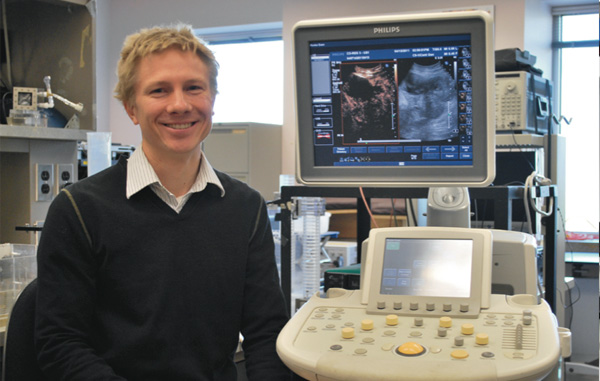Failed experiments: staying motivated when it feels like your research is going nowhere
By Alisa Kim
It happens to so many graduate students: hitting the dreaded wall.
"It's a rite of passage. You haven't done a graduate degree unless you've overcome challenges," says Dr. John Hudson, a post-doctoral fellow in the lab of Dr. Peter Burns, a senior scientist in physical sciences at Sunnybrook Research Institute (SRI).
After graduating with an engineering degree from McMaster University, Hudson began his PhD in medical biophysics at the University of Toronto in 2004. Burns, who is chair of the department, was his supervisor. His project was on the use of ultrasound and ultrasound contrast agents to measure blood flow. As his research progressed, Hudson found himself in unfamiliar territory doing biology and working with preclinical models.
In spite of a steep learning curve and failed experiments, Hudson persevered. It paid off--he successfully defended his thesis last February. He's now working with clinicians from Sunnybrook's Odette Cancer Centre to monitor changes in tumour blood flow in response to antiangiogenic therapy.
Here, he tells Alisa Kim about the obstacles he encountered in his research and how he stayed sane through it all.
When did you start having difficulties with your research?
It happened all throughout. Projects never work the first time you do an experiment. Sometimes the challenges are minor and it takes a bit of extra work. I ran into a roadblock that took about a year to resolve.
What happened?
I was trying to get an ex vivo kidney model to work to use as a perfusion phantom to validate my perfusion model. It sounded easy to do, but it became extremely complicated because as soon as you take an organ out of a living animal, the organ starts to die, and the vascular properties change. It just didn't work. This was right in the middle of my PhD. It was the crucial experiment to my project. I was getting help from everyone I could find. I was downtown talking to transplant surgeons, and in the operating room trying to learn how to handle this material. Eventually we abandoned it and went an entirely different way to validate the model, and that worked within two months. Sometimes you need to know when to call it quits.
How did you deal with the frustration?
I just kept plugging away, kept trying. There comes a point where you have to stop and try to approach the problem from different angles. In graduate school, you're trained to be independent, but it's important to accept other ideas and opinions. Sometimes you have your head down trying to fix something, and all it takes is someone who hasn't seen your problem before to say, 'Have you tried this?' or 'Your machine is unplugged.' I tried to engage other people who might have had some inspiration.
Did your supervisor help you troubleshoot the problem or offer any helpful insights?
My particular problem was something we both didn't have much experience in. I had a [thesis] committee as well; Dr. Graham Wright [director of the Schulich Heart Research Program at SRI] and Dr. Alex Vitkin, from Princess Margaret Hospital. We all brainstormed, and they encouraged me to keep trying to solve it on my own. But they were instrumental in helping me determine to stop. I invested so much time and energy into [this] one thing that it was really hard to stop. They were there to give guidance and make sure I graduated. They were the ones to put their foot down and say, 'Okay, John; let's try to solve this some other way.'
What were some things that helped you stay motivated?
I think it's really important to have a distraction. My big thing is competitive sailing. I've sailed double-handed dinghies down on the lake. It's the best thing ever. Having some side projects that you find interesting that aren't necessarily related to what you're doing [also helped].
What advice do you have for other graduate students who feel stuck in their research?
What really helped me was knowing that I wasn't the only one having problems, that everyone else wasn't just breezing through this. You tend to be an island when your head is stuck in a problem. Knowing this is a common experience in graduate school and that people make it through helped me keep going. I thought, 'You'll make it through, too--eventually.'
|
|


 Nexus Winter 2011
Nexus Winter 2011

